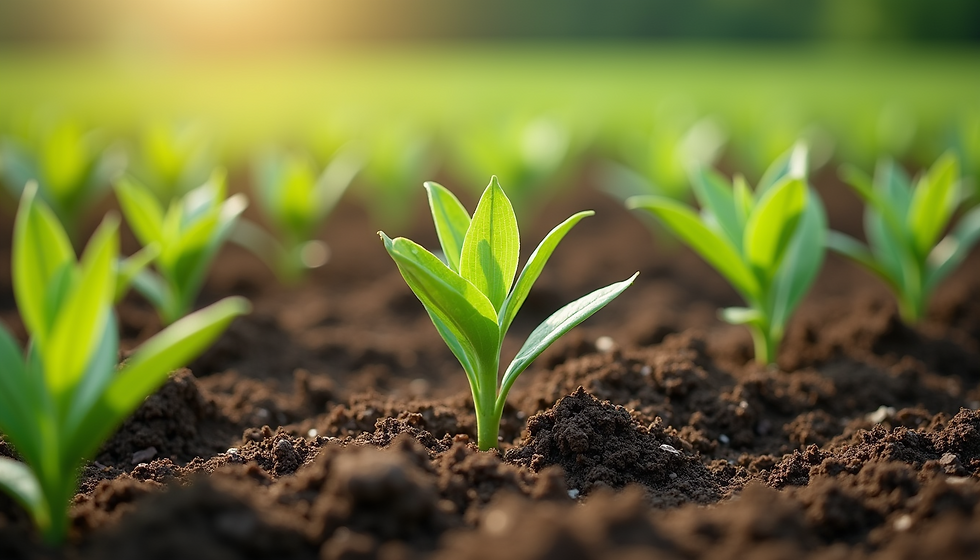Exploring the Impact of Biodegradable Plastic Products on Today’s Businesses
- Harry Zhao
- Jul 14
- 3 min read
In today's world, environmental awareness is more than just a trend; it is a necessity. Companies are leaning toward innovative solutions for their packaging and production processes. Among these solutions is the rise of biodegradable plastic products. This article dives into how these eco-friendly alternatives are changing modern businesses, examining cost implications, consumer perceptions, and more.
The Environmental Challenge
Plastic pollution poses a significant threat to ecosystems across the globe. Traditional plastics can take anywhere from 100 to 1,000 years to break down. This slow decomposition contributes to massive amounts of waste in landfills and oceans.
To address this urgent issue, many companies are making strides to reduce their plastic footprints. Biodegradable plastics, designed to break down more quickly due to the action of microorganisms, present a viable solution to combat environmental damage.
What are Biodegradable Plastics?
Biodegradable plastics are made from natural materials, unlike conventional plastics which are derived from petroleum. Materials such as cornstarch, potato starch, and even certain types of fungi can be engineered into plastics that decompose more efficiently.
This shift not only benefits the environment but provides companies with an opportunity to reduce their carbon emissions, appeal to eco-conscious consumers, and meet growing demands for sustainable practices.
Benefits to Businesses
1. Enhanced Brand Image
Using biodegradable plastic products can significantly enhance a company’s brand image. According to a 2021 survey, 73% of consumers are willing to change their shopping habits to reduce environmental impact. By adopting biodegradable options, companies can align with this consumer sentiment, showcasing their commitment to sustainability and attracting eco-conscious customers.
2. Competitive Advantage
Biodegradable plastics are becoming key differentiators in crowded markets. A 2022 report found that the global market for biodegradable plastics is expected to reach $19.2 billion by 2025. Early adopters can position themselves as leaders, gaining loyalty from consumers who prioritize sustainability in their purchasing decisions.
3. Compliance with Regulations
Various governments are imposing stricter regulations on plastic waste management. For instance, the European Union aims to ban single-use plastics by 2021. Businesses that integrate biodegradable plastics into their operations can stay ahead of these changes, saving themselves from potential fines and enhancing their long-term sustainability.
Challenges in Implementation
1. Cost Considerations
Despite the advantages, one of the major hurdles in adopting biodegradable plastics is the cost. These materials can be up to 20% more expensive than traditional plastics. This cost can create challenges for smaller businesses with limited budgets, making financial planning essential for a successful transition.
2. Performance Concerns
Not all biodegradable plastics are created equal. Companies must closely evaluate whether these materials can meet their specific product requirements, such as durability and shelf life. In some cases, biodegradable options might not perform as well as traditional plastics, leading to necessary changes in product design or packaging.
3. Consumer Education
Many consumers may not fully understand the difference between biodegradable and traditional plastics. Businesses need to invest in educating their customers about the benefits of biodegradable products and how to dispose of them correctly. This educational effort can strengthen customer loyalty and enhance brand engagement.
Case Studies of Successful Integration
1. Food Industry Innovations
The food industry has seen several pioneering examples of biodegradable packaging. For example, a well-known fast-food chain has replaced its plastic straws and utensils with biodegradable counterparts. This change not only appealed to eco-conscious consumers but also garnered positive media attention, reinforcing the brand’s eco-friendly image.
2. Retail Packaging
In the retail space, companies are increasingly turning to biodegradable bags for their products. One notable business initiated a program where customers could return bags for composting. This engagement not only boosted customer satisfaction but also created a community around sustainability, as many customers actively participated in the initiative.
The Future of Biodegradable Plastics in Business
As advancements in technology and production methods continue, the effectiveness and availability of biodegradable plastics are expected to grow. For example, innovations could lead to faster biodegradation times and reduced production costs, encouraging more businesses to make the switch from traditional plastics.
The Role of Innovations
Ongoing research into bioplastics, including improved manufacturing processes and new blends of biodegradable materials, will continue to enhance their appeal. As businesses strive to meet evolving consumer expectations for sustainability, staying informed about these advancements will be key to successful integration.
Shaping Tomorrow's Business Landscape
The impact of biodegradable plastic products on modern businesses is both significant and multifaceted. By adopting these materials, companies can improve their brand image, gain a competitive edge, and adhere to regulatory requirements.
However, they must also address challenges like cost, performance, and consumer education. As the focus on sustainability intensifies, the future for businesses that embrace biodegradable plastics looks promising.
Engaging with eco-conscious consumers not only impacts a company’s reputation but can also dictate its success in an increasingly environmentally aware marketplace. This shift toward biodegradable plastic products is not just an ethical choice, but a strategic decision that will shape the future of commerce.







Comments